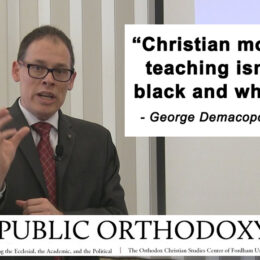Townhall.com | Dennis Prager | July 8, 2008
Last week in Denver, almost all the values of the post-1960s left were exhibited in one act.
It happened on the Denver mayor’s most important day — the one in which he was to deliver his annual State of the City Address. The day was to begin with the singing of the National Anthem by the black jazz singer Rene Marie. But Ms. Marie had, by her own admission, long had other plans. Instead of the National Anthem, she sang “Lift Ev’ry Voice and Sing,” a song written in 1899 and often referred to today as the Black National Anthem.
What Marie did embodied a plethora of leftist ideals and characteristics: Ethical relativism, multiculturalism, the supremacy of feelings, the belief that artists are above normal ethical standards and group victimization.
We begin with ethical relativism. The left’s opposition to Judeo-Christian values is first and foremost an opposition to objective, or universal, ethics. Ethics and morality are relative. There is no objective or universal standard of right and wrong. We are each the source of our own values.
These lessons were learned well by Marie. The notion that lying to the mayor of Denver (a Democrat, as it happens) when she agreed to his invitation to sing the National Anthem was unethical or immoral is foreign to Ms. Marie.
But how could she morally defend something so obviously immoral?
That is what ethical relativism made possible thanks to a number of values of the left.
One such leftist value is multiculturalism. Since the 1960s, a major goal of the left has been to weaken American national identity and replace it with other cultural, national, racial and ethnic identities (in effect, changing the motto of the United States from “From Many, One” to “From One, Many”). It has pursued this goal through bilingual education, election ballots in multiple languages, numerical guidelines in American history textbooks concerning the percentage of space allotted to given minorities, opposition to declaring English America’s national language, and rendering the term “flag waving” a pejorative that implies quasi-fascist sentiments.
One could well imagine a member of any number of other minorities substituting a different song for the National Anthem. The left has successfully taught millions of Americans to honor other national identities while either fearing or disparaging American nationalism. That lesson, too, was clearly learned by Marie.
The idea of a Black National Anthem is a multiculturalist paradigm. A black freedom song, a black hymnal, songs that gave African slaves on American soil some comfort and hope in the midst of their suffering, and, for that matter, “Lift Ev’ry Voice and Sing” — these all fit perfectly into an American national identity. Indeed, all Americans should know such songs. But a Black National Anthem, when substituted for the National Anthem, means that there are two nations on American soil, a black one and an American one.
The left’s second contribution to Marie’s value system has been its elevation of feelings above other values. For example, one determines right and wrong on the basis of how one feels (as opposed to, let us say, asking what one’s religion, or God, or any moral law that transcends one’s own feelings would say on a given matter).
Now, the elevation of one’s feelings above other considerations is generally viewed as a form of narcissism. And while narcissism is as old as humanity, until the 1960s it was generally regarded as a character flaw. Since the 1960s, however, it was more often heralded as a virtue. From recreational drug use to recreational sex, acting on one’s feelings, actions of self-centered narcissism, has been glorified.
The core of this attitude lies in the left’s veneration of feelings. How one feels became all-important. It even determines morality, the rightness or wrongness of an action. Thus, a generation of young people has been raised with the question, “How do you feel about it?” not “Is it right or wrong?”
. . . more




Disagree wholeheartedly with this being leftism or whatever. Perhaps it’s just because I am black but if you haven’t had your history lifted from you wholesale you probably won’t get it. I’m generally very conservative–conservative enough to be shunned by family and friends at times because a black woman shouldn’t think but instead should be towing the Democratic party line–but Lift E’vry Voice and Sing is a wonderful song. It is not the national anthem but it is extremely important to us and I will be teaching it to my child along with the history of black people in this country: the good the bad, the ugly, the bright, the beautiful and the hopeful. Which is exactly what Lift Ev’ry Voice and Sing is all about.
Meona, the song is not the problem. It’s the insulting and unethical manner in which the person who was supposed to sing the National Anthem behaved and their attitude towards everyone else in this country. Prager clearly outlines the reasons why, and I believe he’s right.
With all due respect to those who sacrifcied themselves in the Civil Rights movement, I wholeheartedly disagree with what happened in Denver. Lift E’vry Voice and Sing may be a very nice song regarding the struggle for equal rights, but I am against it being touted as THE “Black National Anthem” as I was told while living in Miami, FL. I disagree with Chris. The song IS the problem.
There is only one nation here; the American nation. This action by Rene Marie only serves to divide whites and blacks, feeding the fires of racism.
David, Let me clarify my point. By “song” I was referring to the words, not having it serve as the “Black National Anthem.” I agree with you that is insulting and very racist.
Lift Ev’ry Voice and Sing has been regarded by Black Americans as their own song/national anthem since before the 1960s. But whatever. I doubt any of you even will try to comprehend so I shall bow out now. Thank you. Please forgive me if I have offended.
Meona,
I think you misunderstood my point. My problem with the song is not the words, the singing of it, or the pride of black Americans have with it.
It is the the very idea of a separate nation by virtue of one’s race, color, etc. I don’t consider any American a “hyphenated-American.” This is the problem we have with trying to promote unity. Without denying our past, our traditions, our cultures, we need to see ourselves as just “Americans.”